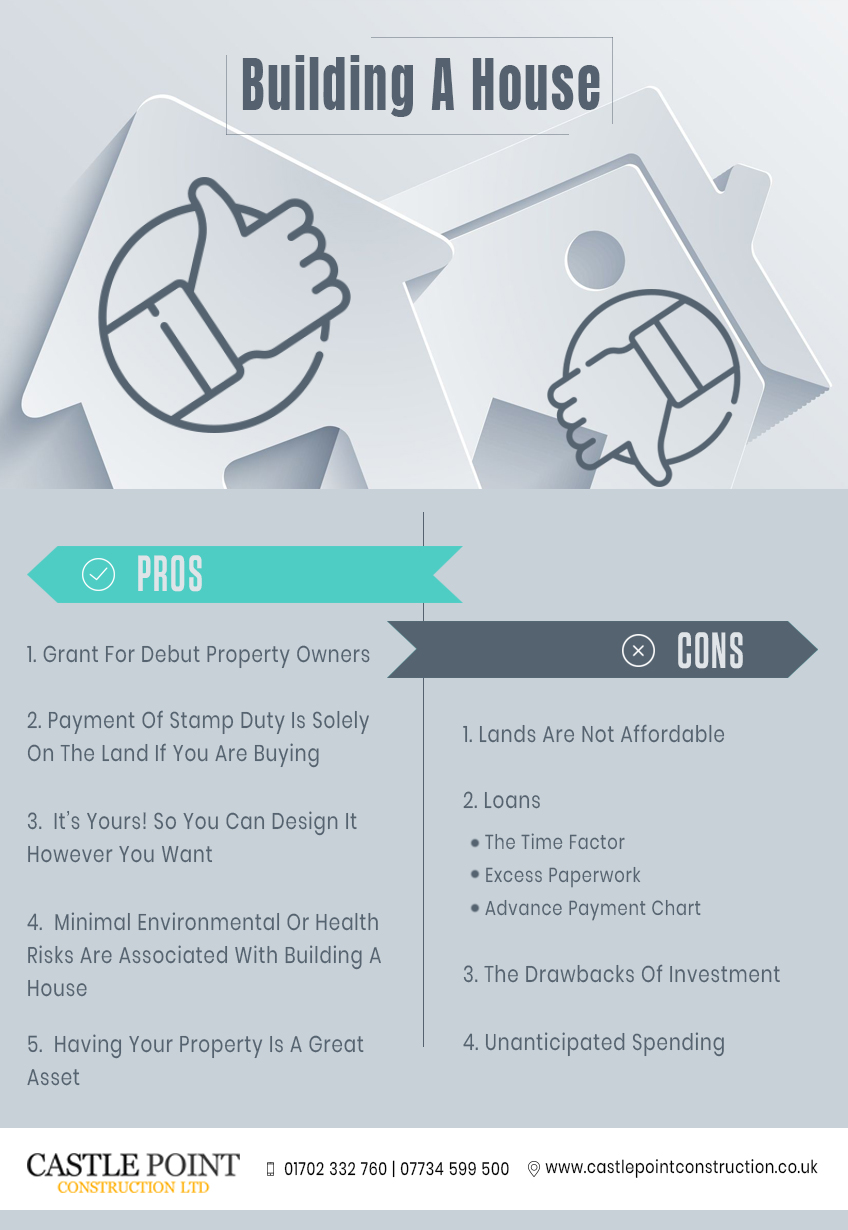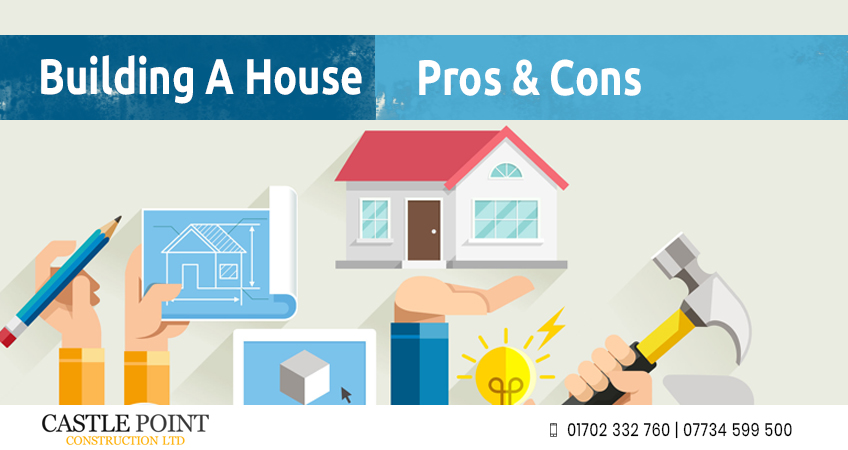To make a decision, there are many variables that you must consider, and the same rule applies to building a house. When it comes to shelter, you have options. You have to decide whether to rent or choose between buying or building your own home. So, you must weigh the pros and cons of each alternative before choosing any. If you are looking to build your own house, we have assembled in this article a list of the pros and cons to aid your decision-making process. Dive in!
PROS
The advantages of building your own house are many but here are the most pertinent:
1) Grant For Debut Property Owners
It is often called the ‘First Home Owners Grant,’ and is primarily for people moving into a new building. That is, no one else has lived in that building before. To qualify for this bonus, you have to do your research and know what category you fall under. For example, checking for what year the house was built (if you are buying, anyway). If you are building your own home, then you should check if the state or region you choose to build permits the First Home Owners Grant.
2) Payment Of Stamp Duty Is Solely On The Land If You Are Buying
When you build or buy a new home, you are obligated to pay the stamp duty on only the land you built on. It means that you can avoid extra costs of paying stamp duty on the house itself.
3) It’s Yours! So You Can Design It However You Want
One indisputable advantage of building a house is that it is your own and you can design it to your taste. Although it is cheaper to go for an existing home than building your own. Nevertheless, when you estimate the cost of house renovations and how long it will take, you will realise that it is sometimes preferable to build your own.
For Builders Southend – Call: 01702 332 760
Building your house from scratch is synonymous to being given a blank canvas to draw your dream specifications and select accessories such as floors, paints, doors, lamps, and cabinets! What’s more, having the free-will during decision-making makes it easier to reduce if not totally eliminate future renovation expenses.
4) Minimal Environmental Or Health Risks Are Associated With Building A House

A new house means that the building would be free of toxins such as asbestos and lead paints, which is usually common in older properties. Furthermore, new homes are often energy efficient because recent construction companies are more conscious of maintenance while they build. Therefore, they use environmentally-friendly and refined building materials for a new house. In the long run, you also get to save energy costs, especially if they implement solar panels, energy-efficient glazing, or contemporary insulation.
5) Having Your Property Is A Great Asset
In the concept of properties, there are liabilities and assets. When you want to acquire a property, the best type is a land or building because they are both significant assets. The investment options include selling it or renting it out and becoming a landlord.
A new building is accessible to its owner as a complete deflation deduction, which makes a house appealing to potential tenants.
6) Less Real Estate Hassle
Building your own home helps you to avoid dealing with the chore of house-hunting. As approved by the National Association of Realtors (NAR), the standard period an existing building can stay on the market for is 30 days. When you build your home, you can concentrate on other important things rather than house-hunting.
CONS
The disadvantages of building a house include:
1) Lands Are Not Affordable
The main bane of building a house is acquiring land. In most developed countries and the UK especially, buying land is very difficult and expensive. On the other hand, you also have to consider the jurisdiction you choose based on other factors. Therefore, you may have to resort to loaning. You will find out more about loans later in the article.
2) Loans

These days, getting a home that is designed to your interest is easier because you are offered convenient options. The alternatives include either purchasing a built home, where all you have to do is add the finishing you prefer; or build your house altogether. Loaning requires careful deliberation and below are the ruses to watch out for:
- The Time Factor
You must consider how long it will take to build your house because it affects the loan you need. On average, it takes approximately seven months to build a new house from scratch. Nevertheless, the duration has ultimately increased because construction is more intricate than it used to be. In most cases, home loan granters give a specific lapse of time for reimbursement, which is risky for you. It means that you are at risk of losing your collateral, if any when you exceed the given timeframe. However, you can request an extension in case of necessity, but the lender isn’t obligated to agree. The regular interval ranges from six to twenty-four months.
Since it could be a while before you move into your new home, it is also important that you consider your living condition. You must estimate the amount it will cost to get a temporary shelter for the duration of the construction. It will help you minimise the cost of any unforeseen expenses, which is likely to happen during new construction. Some other factors that steal away your time if you choose to build a house include:
1. You must exercise patience to decide on the building plan that is suitable for your block of land. This time-wasting factor is mostly in cases where you didn’t initially pick a home and land package.
2. Ensuring that you don’t break any building codes in the region your land is located in also takes time. You will have to examine all the local council stipulations, so you don’t overstep. Failure to follow the codes could be seen as breaking the law, and the penalty depends on the jurisdiction. However, the worst case scenario is losing your building or demolishment.
- Excess Paperwork
This factor mostly applies to entrenched homes because you need vital documents such as recent bank account statements, income receipts, and credit cards review. Other required documents that relate to construction include:
- Building Permits
- Building Plans
- Building Contracts
- Building Insurance
Furthermore, the lender would need updates if any alteration in building expenses, layout, and contracts occur.
- Advance Payment Chart
No construction loan does not entail ongoing payments while you are still building. Therefore, you must double check the information on your payment terms before agreeing. While some organisations charge you per payment, others only require a one-off commission.
3) The Drawbacks Of Investment
It is not in all cases that building a new house can serve as an investment. It, however, boils down to the factors you consider before building the house. When you consider the factors before investing, you should ensure that you make the right choice. For instance, you should carefully examine the location of your land before buying it. Building your home in an undeveloped area with no potential will reduce the value.
Also, in some cases, the chances of having a high capital growth on a newly built house are relatively low. Ancient or established homes have higher possibilities if you invest in remodelling and renovations.
4) Unanticipated Spending
In most cases, unplanned expenses are usually unavoidable during new construction. For this purpose, it is recommended that you employ a real estate agent. They are professionals who have more knowledge and skills in handling builders. You can also help yourself by drawing a budget plan meant for expenses you can solve with cash. Lastly, you should discuss at length with the builders and find out all relevant as well as irrelevant details about the construction. You must include your agent in the discussion to prevent unaware costs.
Furthermore, a review of the contract with the construction company you pick is essential. Watch out for overlooked expenditure such as driveways, site costs, light fittings, landscaping as well as any other inclusions you require.
If you are buying off the plan, you should endeavour to inspect the house before payment is made. Sometimes, the quality of the house appliances is lower than what they seem in pictures. Examining the house will help you confirm the standard of the house features.
Finally, you should be aware that making any adjustments to an ongoing construction incurs more expenses. Therefore, you should be sure of what you want before making any final decisions. Such expenses include:
- Mulct charge from the builder
- Draft charges to the builder, architect, and engineer
- Legal costs to change the contract
- Additional materials and workforce
In Conclusion
Building your own house is a thing of pride. However, now that we have enlightened you about the pros and cons of venturing into the act, all that is left is for you to decide what works best for you.

